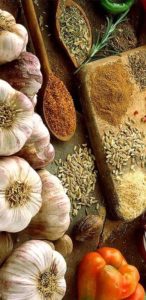From our list of herbs and spices, the following are recommended for Hay fever:
Scroll down for links.
- Butterbur
- Cayenne
- Citrus Bioflavonoids
- Eyebright
- Fenugreek
- Horehound
- Lobelia
- Mullein Leaf
- Quercetin
- Red Wine Extract
- Stinging nettle
Natural Cures and Remedies for Hay fever
Hay fever: like eczema and asthma, this requires an individual approach combined with adjustments to the diet and the patient’s environment.

Contraindications, Interactions, and Side Effects (St John’s-Wort) – Class 2d. May potentiate MAOIs (AHP). Active ingredients may be photoactive, especially in fair-skinned people. Reichert takes it even more seriously: Although hypericum is not as strong as synthetic MAOIs, patients should still avoid the things usually avoided: high tyramine foods (smoked or pickled), alcoholic beverages, amphetamines, cold and hay fever remedies, narcotics, tryptophan, and tyrosine (I no longer believe this caveat is desirable). Do not take during pregnancy or intense sun exposure (Reichert, 1994; WAM). Commission E reports adverse effect of photosensitivity. Other sources report flowering top permitted for external use only; not to be used before exposure to sunlight (AEH). Foster (1996) is moderate, suggesting that St John’s-Wort should not be mixed with synthetic antidepressants. Because it may inhibit MAO, taking it with SSRIs, such as Prozac, could cause serious health damage. Although side effects have not been reported in clinical studies, range animals eating the plant and then standing in bright sunlight have experienced sunburn or blindness from photosensitization. This treatment option should be discussed with your health care provider (Foster, 1996). The Herbal PDR state that photodermatosis in animals usually kicks in after high doses, such as 3000 mg per kg body weight (PHR). CAN cautions that hypericin is phototoxic.
Butterbur, Cayenne, Citrus Bioflavonoids, Eyebright, Fenugreek, Horehound, Lobelia, Mullein Leaf, Quercetin, Red Wine Extract, Stinging nettle
For preventive purposes, the entire C complex vitamins – known as the bioflavonoids, are recommended. They gradually strengthen cell permeability to help immunise the body from various allergies, especially hay fever. Often the addition B5 , or pantothenic acid brings great relief to allergy sufferers. Multiple allergies may result from poor adrenal gland functioning. In such cases liberal amounts of pantothenic acids help cure them, although the recovery will take several weeks. An adequate intake of vitamin E is also beneficial as this vitamin possesses effective anti-allergic properties, as some studies have shown.
Some physicians have become receptive to nutritional therapies because vitamin supplements relieved or eliminated their own allergies. For example, Robert Cathcart III, M.D., was impressed by how vitamin C supplements relieved his hay fever, and he went on to become one of the leading experts in the clinical use of vitamin C to fight infections.
Elderflower can be used both for nipping a cold in the bud and for the treatment of various symptoms of a cold. Ideally, if you start taking it right at the onset of symptoms you should not develop a cold at all, but if you do, it is still worth taking elderflower tea or tincture as you will recover more quickly and your symptoms will be milder. Apart from being antiviral, elderflower has anti-catarrhal properties, so it is especially worth taking this tea or tincture in situations when catarrh is a prominent symptom, and this applies to an ordinary runny nose as well as to allergic reactions and hay fever. As elderflower is a warming herb you can feel quite hot for a short while after taking it, especially after drinking a hot elderflower tea. This warming effect is useful for reducing a mildly raised temperature.
Butterbur
Cayenne
Citrus Bioflavonoids
Eyebright
Fenugreek
Horehound
Lobelia
Mullein Leaf
Quercetin
Red Wine Extract
Stinging nettle
Hay Fever ; Headache ; Hemorrhoid ; Hepatosis ; Hysteria ; Induration ; Insomnia ; Mastosis ; Nausea ; Nephrosis ; Nervousness ; Pain ; Palpitation ; Rheumatism ; Sore ; Splenosis ; Stomachache ; Water Retention ; Worm ; Wound .
